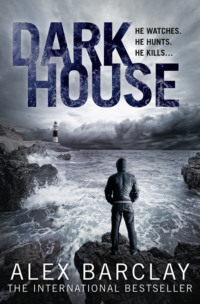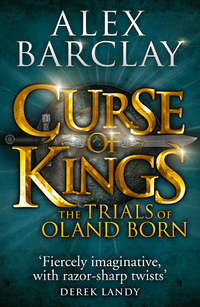
Полная версия
The Drowning Child



Copyright
HarperCollinsPublishers
1 London Bridge Street
London SE1 9GF
www.harpercollins.co.uk
Published by HarperCollinsPublishers 2016
Copyright © Alex Barclay 2016
Cover design layout © HarperCollinsPublishers 2016
Cover photographs © Stephen Mulcahey/Arcangel Images (boy); Mike Dobel/Arcangel Images (background)
Alex Barclay asserts the moral right to be identified as the author of this work
A catalogue record for this book is available from the British Library
This is entirely a work of fiction. The names, characters and incidents portrayed in it are the work of the author’s imagination. Any resemblance to actual persons, living or dead, events or localities is entirely coincidental.
All rights reserved under International and Pan-American Copyright Conventions. By payment of the required fees, you have been granted the non-exclusive, non-transferable right to access and read the text of this e-book on-screen. No part of this text may be reproduced, transmitted, down-loaded, decompiled, reverse engineered, or stored in or introduced into any information storage and retrieval system, in any form or by any means, whether electronic or mechanical, now known or hereinafter invented, without the express written permission of HarperCollins e-books
Ebook Edition © SEPTEMBER 2016 ISBN: 9780007494583
Version: 2016-08-10
Praise for Alex Barclay:
‘Gripping, stylish, convincing’ Sunday Times
‘The rising star of the hard-boiled crime fiction world, combining wild characters, surprising plots and massive backdrops with a touch of dry humour’ Mirror
‘Tense, no-punches-pulled thriller that will have you on the edge of your deckchair.’ Woman and Home
‘Explosive’ Company
‘Compelling’ Glamour
‘Excellent summer reading … Barclay has the confidence to move her story along slowly, and deftly explores the relationships between her characters’ Sunday Telegraph
‘The thriller of the summer’ Irish Independent
‘If you haven’t discovered Alex Barclay, it’s time to jump on the bandwagon’ Image Magazine
Dedication
For my editor, the wonderful Sarah Hodgson
Epigraph
To a Dying Girl
How quickly must she go?
She calls dark swans from mirrors everywhere:
From halls and porticos, from pools of air.
How quickly must she know?
They wander through the fathoms of her eye,
Waning southerly until their cry
Is gone where she must go.
How quickly does the cloudfire streak the sky,
Tremble on the peaks, then cool and die?
She moves like evening into night,
Forgetful as the swans forget their flight
Or spring the fragile snow,
So quickly she must go.
Clinton F. Larson
Contents
Cover
Title Page
Copyright
Praise
Dedication
Epigraph
Prologue
Chapter 1
Chapter 2
Chapter 3
Chapter 4
Chapter 5
Chapter 6
Chapter 7
Chapter 8
Chapter 9
Chapter 10
Chapter 11
Chapter 12
Chapter 13
Chapter 14
Chapter 15
Chapter 16
Chapter 17
Chapter 18
Chapter 19
Chapter 20
Chapter 21
Chapter 22
Chapter 23
Chapter 24
Chapter 25
Chapter 26
Chapter 27
Chapter 28
Chapter 29
Chapter 30
Chapter 31
Chapter 32
Chapter 33
Chapter 34
Chapter 35
Chapter 36
Chapter 37
Chapter 38
Chapter 39
Chapter 40
Chapter 41
Chapter 42
Chapter 43
Chapter 44
Chapter 45
Chapter 46
Chapter 47
Chapter 48
Chapter 49
Chapter 50
Chapter 51
Chapter 52
Chapter 53
Chapter 54
Chapter 55
Chapter 56
Chapter 57
Chapter 58
Chapter 59
Chapter 60
Chapter 61
Chapter 62
Chapter 63
Chapter 64
Chapter 65
Chapter 66
Chapter 67
Chapter 68
Chapter 69
Chapter 70
Chapter 71
Chapter 72
Chapter 73
Chapter 74
Chapter 75
Chapter 76
Chapter 77
Chapter 78
Chapter 79
Acknowledgements
If you enjoyed The Drowning Child, try the previous book in the Ren Bryce series
About the Author
Also by Alex Barclay
About the Publisher
PROLOGUE
February 12
Jimmy Lyle was lying, bleeding, by the pond in Montgomery Park. Behind him, at the water’s farthest edge, four ice-white swans moved with mechanical serenity, necks as long as their bodies, black eyes on brighter views.
Jimmy drifted in and out of consciousness, aware of rallying bystanders, footsteps, the tones of cell phone keys, raised voices, concern. He could smell his own blood. He had taken multiple blows to the face before he dropped to the ground, powerful kicks to the ribs and abdomen as he lay there. His left eyeball was swollen like a nut. His right eyelid flickered. Darkness to light, darkness to light.
When Jimmy was a boy, his favorite toy was a slide puzzle. He remembered how quickly his little thumbs pushed the tiles around to put the photo of a gray duckling back together again. Sometimes, he would close his eyes as he clicked the final piece into place, hoping that when he opened them, the duckling would have turned into a swan.
‘His little girl!’ someone was shouting. ‘His little girl! She’s gone! She was right there! Then a guy showed up … he just … he beat the shit out of him! Took his little girl!’
There was a man’s voice, an authoritative one. ‘Do you think you could give me a description of the attacker, ma’am?’
‘Short white guy, stocky, brown hair, khakis and a dark polo shirt, white sneakers too,’ said the witness. ‘Early thirties is my best guess.’
‘Could that have been a uniform of some kind he was wearing?’ said the officer. ‘Like a store uniform?’
‘I … don’t think so – it was just, you know, those boring guys, what they wear. Guys with a boring job and a nice wife back home.’
‘And the little girl?’ said the officer.
‘She was seven years old, eight?’ said the witness. ‘Pink leggings, pink top with a rainbow on it and something writ across it and … white socks, white sneakers? She’d been crouching down, right there, feeding the swans with her daddy.’
‘This man right here,’ said the officer.
‘Yes!’ thought Jimmy Lyle. ‘Yes!’ Blood bubbled from his mouth. More footsteps, two men, crouched beside him.
‘Yes – him!’ said the witness. ‘I’m sorry. I can’t look at him. Is he … gonna make it?’
‘He may be able to hear you, ma’am,’ said the officer. ‘Keep talking me through what you saw.’
‘The rest was a blur,’ said the witness, ‘except that the little girl must have fallen in, her daddy tried to pull her out, but next thing that man was down on him, beating on him, taking his little girl. It was crazy.’
Jimmy Lyle felt a presence beside him.
‘Can you tell me your name, sir?’ He was checking his pulse. He was a paramedic. Jimmy could feel a second man kneeling to his right.
‘No – I can’t tell you my name,’ thought Jimmy Lyle. ‘I can’t.’
They could search his pockets for ID, but he had none. He had no cell phone. He felt a hard pinch on his finger and recoiled from the pain. Then the paramedics’ words, back and forth, interchangeable voices, descriptions, instructions. ‘His GCS is nine, get the collar, put on O2 and put it on fifteen liters …’
Jimmy could feel hands on his head, holding it secure, as a collar was strapped around his neck, the padding tight against his ears, the sound sucked from the world. The paramedics inserted the IV, delivered the shot of dopamine that would increase his blood pressure, hung the bag that would fill his veins with circulating fluid.
At first, it worked. Then, the numbers changed; his respiratory rate dropped from twelve breaths per minute to four, his GCS fell to six.
They were about to tube him when Jimmy Lyle coughed, and his heart surged like a lagging runner in the home straight.
As he was stretchered past the pond, Jimmy Lyle thanked God for misperception, for absent facts, for the blind faith of good hearts and decent souls. The passersby should have passed on by. That little girl wasn’t ‘his little girl’. The man who beat him to a pulp was the little girl’s father. He had told her to turn away and cover her ears as he dragged Jimmy into the bushes and beat him without letting up, without caring whether it would send him to the ER or his grave. Then he fled, covered in Jimmy’s blood, his thick arms clutching his weeping, soaking-wet daughter to his chest.
Jimmy Lyle was a piece of shit, and, thanks to the kindness of strangers and the dedication of paramedics, remained a living, breathing, piece of shit.
1
March 6
Lake Verny spat and crackled with a relentless, piercing rain. Clyde Brimmer sat at a table in the window of The Crow Bar, looking beyond his reflection, beyond the candlelight that captured a face plowed for years by whiskey and the elements. In his tight right hand, he was holding a round white moonstone.
‘That lake has secrets that the rain wants to tell.’ Clyde spoke loud enough to be heard, but there was only one person there to hear him, and she was doing nothing more than standing behind the bar and staring ahead, her amber hair and freckles glowing in the dim light above her. She had showered today, at least. She had made it. Strike another day off the bleak remainder of the life of Shannon Fuller.
‘It won’t stop ’til it gets to the bottom of something,’ said Clyde. ‘Might be the lake bed, might be …’
Clyde liked to trail off; it was his lonely man’s way of leaving a door open to further engagement, of luring more questions from whoever might be listening. He spoke to customers of his careful choosing, and he spoke to Shannon. He trusted her, without even realizing that in all his years of drinking, she was the only bartender who could set his pace, who could keep him a civilized man until closing time. He had better nights when she was on.
He shifted the moonstone into the grip of his two smallest fingers, then hammered the rutted tabletop to mimic the rain.
‘I have no doubt,’ said Shannon, dealing another card from the bartender’s conversational deck – I have no doubt, it sure is, they sure do, can’t argue with that, who’re you telling, can’t beat it, you bet, sounds about right …
Nothing moved except her mouth.
‘One for the road,’ said Clyde, and Shannon Fuller moved like someone had put a coin in a slot and a mechanism was kicked off. It came to an end when her reflection joined Clyde’s in the window as she set a Scotch down in front of him.
‘One for the road to Tate,’ she said. Tate was the town five miles away; halfway there was the brokedown house Clyde inherited from his grandmother. Some nights, Shannon gave him a ride home. Other nights, it was whoever else was high on pity.
Clyde raised his hands, gripping the air. ‘It’s got the wrong energy,’ he said. He looked up at Shannon. ‘Can you feel it?’
‘I can’t feel much of anything right now,’ thought Shannon, but she kept that line in the buzz-kill deck – the cards no good bartender dealt; I’m lonely, I’m divorcing, I’ve got cancer, I’ve been abandoned, I’m lost, I’m fucking dying inside, I’m alone, I’m alone, I’m alone.
‘I can feel it,’ said Clyde, clearing her pain to vault into his own – in his chest, in his heart, as he watched the lake rising, watched the water slap up over the banks.
Shannon Fuller knew that, in a sober state, Clyde never would have spoken about the energy of the lake that had taken away her eleven-year-old son, Aaron, only six weeks earlier. Aaron’s was the last body Clyde had embalmed before he was fired for drinking on the job. Two weeks earlier, when Shannon crawled back to work to pay the bills, Clyde had stood weeping at the bar, clutching her clasped hands, swearing he was sober when he tended to her boy. And she believed him.
She gave him some work since then, odd jobs at the cabins and in the grounds. And when he wasn’t doing that, he was in The Crow Bar, drinking until eleven at night, he and Shannon overlooking the killing lake, finding unspoken comfort in their somber bond, as the last two people to lay their hands on Aaron.
The door to the bar slammed back against the wall and Seth Fuller walked in, his tall, thin frame swamped in oversized rain gear. He snapped his head back to shed the hood, and pulled the door closed behind him.
‘Lady and gentleman, we’ve got an escaped convict,’ he said, in a dramatic old-style newsreel voice. He smiled, then switched back to his own – a slow, young and dumber one. ‘He broke free from my alma mater yesterday afternoon. Well, during a hospital visit.’ Seth glanced down at Clyde’s full glass, then shook his jacket off, turning back to hang it on a wooden peg. ‘So,’ he said, ‘BOLO for bald brick shithouse, Franklin J. Merrifield – white male, dumb as a box of frogs, forty-eight years old, meth-cooking, drug-dealing, motherfucking, teen-raping, fire-starting—’
‘You knew the guy?’ said Clyde.
‘I knew the guy,’ said Seth. ‘Approach with caution.’ He smiled. ‘And that was tonight’s public service announcement from Tate PD with a few insider extras from reformed maker of trouble, prisoner number G65746.’ He walked up to the bar. ‘Aunt Shannon, I am at your service.’
They shared the same glow, the same amber-colored freckles, but the rest of Seth – the shaven head, the narrow features, the flesh, the bones beneath – came together in a colder, darker way.
Seth tilted his head toward Clyde.
‘Take a seat,’ said Shannon. ‘Let me pour you a drink. He’s like a scared puppy tonight.’
Clyde’s right leg was bouncing now, striking the underside of the table, rippling the whiskey in his glass. It wasn’t long before it tipped over. He chased it across the table with his hand, but the rich flow of liquor through his veins and his shot reflexes meant all that happened was the moonstone slipped from his grip, skidded over the edge, and landed in the fallen whiskey.
Shannon grabbed a cloth and rushed to Clyde.
‘Do not move,’ she said. She knew he had no balance, drunk or sober. She knew Clyde as well as he didn’t know himself.
He stopped, then settled again in his seat. Shannon crouched down beside him, stopped when she saw the moonstone.
‘Is this yours?’ she said, picking it up.
He nodded. She stood up and shook the whiskey off it. A drop struck the candle’s flame. It sizzled and died.
‘It’s a moonstone,’ said Clyde. ‘The traveler’s stone – it protects those who cross water when the moon shines.’
His gaze moved from the wet black candle wick to what lay beyond the window.
‘You can’t trust water and you can’t trust fire,’ said Clyde. ‘And out there? That lake’s ablaze.’
Franklin J. Merrifield drifted awake from a profound, distressing sleep. What followed was the slow realization that he was not in his cell. He could smell rain, grass, trees, earth. The last time he smelled those smells was on that final shackled walk from the courthouse.
The only sound he could hear was rain hitting glass.
Glass?
He waited for his eyes to adjust, for shapes to form, for light to filter in, but the darkness was absolute. His heart started to pound wildly. His head felt strange, like it was overstuffed with packing materials; foam or twisted-up pieces of brown paper. His body felt solid, weighted down. His jaw was clamped shut. When he opened it, he felt the skin on his lips tear. He could taste blood.
He had just one question:
How the fuck did I get here?
2
Special Agent Ren Bryce was sitting in Manny’s Bar on 38th and Walnut in Denver.
It has been six months since my last alcoholic beverage.
She was five beers down.
Until tonight.
It was six months since a shooting at the Rocky Mountain Safe Streets Task Force, when a serial killer called Duke Rawlins had taken the lives of two of her friends and colleagues, and her boyfriend of one year, Ben Rader.
She picked up her cell phone.
Don’t.
She put it down, slumped back in the bar stool, closed her eyes.
What if that had no back on it oh my God I am so fucking hammered imagine falling off a bar stool hitting your head and dying what a way to go appropriate Jesus.
She opened her eyes, and picked up her phone again. She went into Album.
Don’t.
She found a photo of the boyfriend she had yet to call her former, her late … Ben Rader. The Late Ben Rader.
Tears filled her eyes. In the photo, Ben was cooking, smiling at her over his shoulder. He had a beaming smile, and was one of the most beautiful men she had ever known; short, tanned, dark-haired, fit.
You look so young.
A man as handsome as Ben Rader could have relied on his looks, developed nothing more than his body, but Ben developed a soul that radiated kindness.
I loved watching you cook Jesus you’re dead now you’re fucking dead this is so screwed up dead Jesus and you only look about eighteen you are so hot were no I can’t do past tense are are are amazing arms steady grip strength of all kinds love love love gone gone gone stop stop stop.
She still had his texts; they felt like a weight in her phone that she was always aware of, but could never remove.
Can’t imagine ever sending another loving text filthy text miss-you text to any other man I don’t want a stranger in my bed I don’t want another man in my head.
Her cell phone rang. GARY flashed on the screen.
No way.
Her boss, Supervisory Special Agent, Gary Dettling.
Yeah hey Gary I’m in Manny’s yeah the bar where the serial killer who killed our friends picked up one of his victims yeah what is that telling you what is it telling me who fucking cares have you been drinking Ren yes Gary two beers and I’m about to leave …
She let it go to voicemail.
Gary left a message, and followed it with a text.
Call me – CARD
Shit.
Three months earlier, she and Gary had joined the North West Region’s Child Abduction Rapid Deployment team – CARD. There were sixty members in the country, split across five regions, ready to deploy at the invitation of local law enforcement to help in the crucial early stages of a child disappearance or abduction. Though an invitation was welcome, it wasn’t a requirement – when it came to a ‘child of tender years’, twelve years old and under, the FBI was automatically involved, whether there was an interstate element or not.
Ren called him back.
Breathe speak slowly breathe speak slowly enunciate.
‘Hi, Gary – sorry I missed you.’
‘Get a good night’s sleep,’ said Gary. ‘We’re—’ He paused. ‘Where are you?’
Um … ‘On my way home.’
‘From a bar?’
‘From a bar.’
Pause. ‘We’re booked on a six a.m. flight to Portland, Oregon, heading for the town of Tate. Missing twelve-year-old boy: Caleb Veir, last seen by his father at seven forty-five this morning when he left the family home to take the fifteen-minute walk to school.’
‘OK.’ Say as little as possible.
Pause. ‘Ren—’
‘See you at five.’ Ren hung up.
Step away from the phone.
She put it on the bar, picked up her beer and drank the last of it. She ordered another. She checked her watch.
Ugh Denver airport five a.m.
Denver airport – where memories flew at her like razors, where she had welcomed Ben, kissed him, hugged him, seen him off. Denver airport – the last place she was before she drove home to find out that he had been killed.
She looked back at his photograph as she waited for her drink.
That’s it. Life over.
I should have taken more photos.
Her stomach turned.
You were an asshole to him that night anyway just delete it you were always an asshole to him he loved you and you were an asshole.
She started to cry.
Get your shit together you stupid bitch go home just go you’re a mess everyone’s looking at you you mess.
She stood up, pulled on her coat, paid for the drinks. She walked into the cold night, and her stomach spasmed, her throat constricted.
You fucking loser again fucking asking to enrage Gary you self-destructive I can still get five hours’ sleep yeah whatever whatever I’m still here I’m still alive no one died yes they did you asshole yes they did fucking die.
She started to walk toward her Jeep.
Shiiiiiit. My CARD team Mac is at the office. Fuuuck.
Ren pulled up outside the Livestock Exchange Building where Safe Streets had the fourth floor. She put the Jeep into park, paused until her eyes could focus.
I can’t believe I drove here of course you drove you don’t give a shit a bit late to care now you loser you’re going to die.
She grabbed her phone, scrolled through iTunes, picked a song from the filthy rap collection, and put in her earpods. Since the shootings, it was her routine any time she walked into Safe Streets alone: she didn’t want to risk hearing the banging door she heard that evening, which she found out later had been the door to the basement where Ben’s body had been thrown after Duke Rawlins shot him dead.








